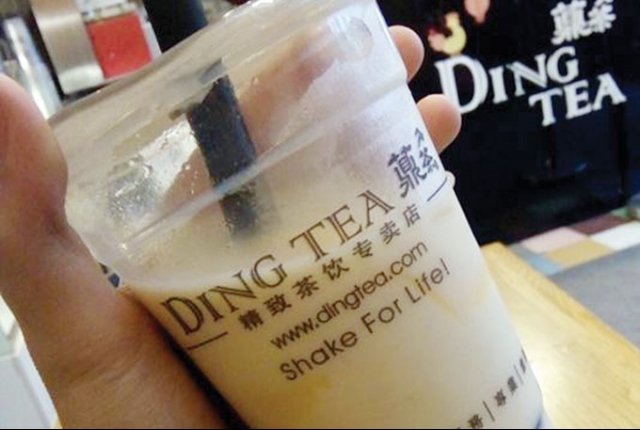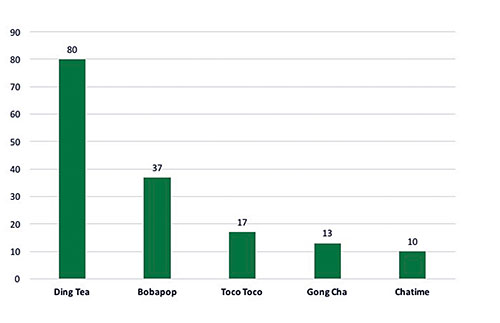The boom of milk tea brands in Vietnam
While Ding Tea and Gong Cha outlets are designed in a modern style with black as the main color, Chatime outlets aim at bringing comfort to customers and have purple as the design concept.
These major franchise brands have now become fiercely competitive in Vietnam’s milk tea battleground.
Boom in openings

Arriving in Vietnam at the end of 2012, Chatime has now developed its franchise model, with ten outlets in Hanoi and Ho Chi Minh City and sells an average of 300 cups a day at each.
Chatime is a Taiwan milk tea brand, with over 1,000 outlets around the world. It provides stylish and health-conscious customers with a selection of freshly brewed tea infused with different natural flavors.
To make Chatime a global brand, it has modernized traditional tea culture by producing high-tech tea equipment to make fresh tea of consistent quality.
Ms. Nguyen Xuan Nga, COO of Chatime Vietnam, told VET that quality and reasonable prices are important factors in retaining customers over the long term.
“Chatime is asserting its position in the milk tea market with price stability, product quality, and service quality,” she said.
To expand, Chatime will seek partners in cities and provinces around the country with tourism potential.
Mumber of milk tea outlets, by brand

Source: VET research
Meanwhile, two years after arriving in Vietnam, Gong Cha milk tea from Taiwan has 13 outlets, including eight belonging to the company and five franchises.
Mr. Nguyen Hoai Phuong, Brand Representative, told local media that the company will expand its network in many provinces in the future, especially those in the south.
“We are still trying to build credibility and customer numbers,” he said.
Ding Tea is the largest Taiwanese milk tea franchise in the country in terms of locations, with more than 90 outlets nationwide, of which 60 in Hanoi belong to the company and more than 30 outside of the capital are franchises.
According to Mr. Sean T. Ngo, CEO of VF Franchise Consulting, franchising will be a growing sector in Vietnam as franchisors recognize that its culture of entrepreneurship allows investors to start a business with controlled levels of investment and at reduced risk.
Some domestic milk tea brands are also creating competition in the market. Phuc Long is a popular tea and coffee brand among young Vietnamese, especially its milk tea, and has opened 22 outlets in Ho Chi Minh City to date.
CEO Mr. Lam Chan Huy told VET that it has not yet fully expanded in the Ho Chi Minh City market and is still to exploit the potential in other major cities.
In order for a brand to maintain a niche in the market requires investment and comprehensive market research, he believes, such as in market demand and trends, demographics, and competitors.
“The long-term development strategy of Phuc Long is in product quality, bringing quality products to the food and beverage (F&B) market in particular and to the milk tea market in general,” he said.
Mr. Ngo said that consumers are now looking for quality and freshness in the products they consume and can be very brand conscious.
Another major Vietnamese milk tea brand, Bobapop, recorded successful business results last year.
Sales increased from about $1.2 million in 2015 to $2.9 million in 2016. Its outlets stood at 37 around the country and it is now focusing on expanding its market in the north and plans to have 50 stores nationwide by June this year.
Ms. Amy Tran, co-founder and COO of Bobapop, said the company has been promoting franchising to all provinces in the country and will also strike franchise deals in China, Singapore and Thailand in the future.
Trend or hype?
Milk tea shop chains are not a new trend in Vietnam, as they were first introduced in the country at the end of 2002, but they have developed vigorously over the last decade.
Milk tea is not just a popular drink among teenagers; it is also becoming popular among people of all ages and social class.
Though not mushrooming like coffee shops, due to lower market demand, milk tea shop chains are nonetheless considered a potential business model in the F&B sector. According to Mr. Ngo, the trend for F&B companies to jump on the bandwagon and get a piece of the action will always be around, whether in milk tea, coffee, or desserts.
Milk tea products still have room for development in the local market, because Vietnam’s F&B sector has been recording stable growth over the past few years and forecasts are positive to 2020, according to Ms. Nguyen Phi Van, Chairman of Retail & Franchise Asia.
It is estimated that the sector’s growth rate will be at around 5.7 per cent annually, with total revenue by 2020 reaching nearly $24.7 billion.
Moreover, in recent reports from Nielsen Vietnam, the beverage category has been the shining light in the FMCG market for continuous quarters, constantly contributing nearly 40 per cent to total FMCG sales.
The country’s younger generation (15 to 34 years old), which account for more than 36 per cent of the total population, is where the milk tea market has potential.
On the other hand, the boom in milk tea brands also raises a question about their longevity in the market given the departure of some coffee chains in recent years.
Long-time players in a market, especially F&B products, depend on a combination of several factors.
“Brands that tend to have longevity are those that have great and consistent products and services at a reasonable price,” Mr. Ngo said.
“Some brands pop up and those qualities are not there. Consumers are quick to determine which brands are good and where they want to spend their money.”
According to Ms. Amy Tran, some F&B brands cannot survive in Vietnam’s retail market not because they are not sufficiently strong to expand but because they did not develop their products in accordance with local consumers’ taste and demands.
Another difficulty, according to Ms. Phi Van, is that franchising in the milk tea market, especially for those from Taiwan, often has distinct policies compared to other traditional franchise brands from Europe.
What the stars mean:
★ Poor ★ ★ Promising ★★★ Good ★★★★ Very good ★★★★★ Exceptional
Latest News
More News
- Masan Consumer names new deputy CEO to drive foods and beverages growth (February 23, 2026 | 20:52)
- Myriad risks ahead, but ones Vietnam can confront (February 20, 2026 | 15:02)
- Vietnam making the leap into AI and semiconductors (February 20, 2026 | 09:37)
- Funding must be activated for semiconductor success (February 20, 2026 | 09:20)
- Resilience as new benchmark for smarter infrastructure (February 19, 2026 | 20:35)
- A golden time to shine within ASEAN (February 19, 2026 | 20:22)
- Vietnam’s pivotal year for advancing sustainability (February 19, 2026 | 08:44)
- Strengthening the core role of industry and trade (February 19, 2026 | 08:35)
- Future orientations for healthcare improvements (February 19, 2026 | 08:29)
- Infrastructure orientations suitable for a new chapter (February 19, 2026 | 08:15)















 Mobile Version
Mobile Version